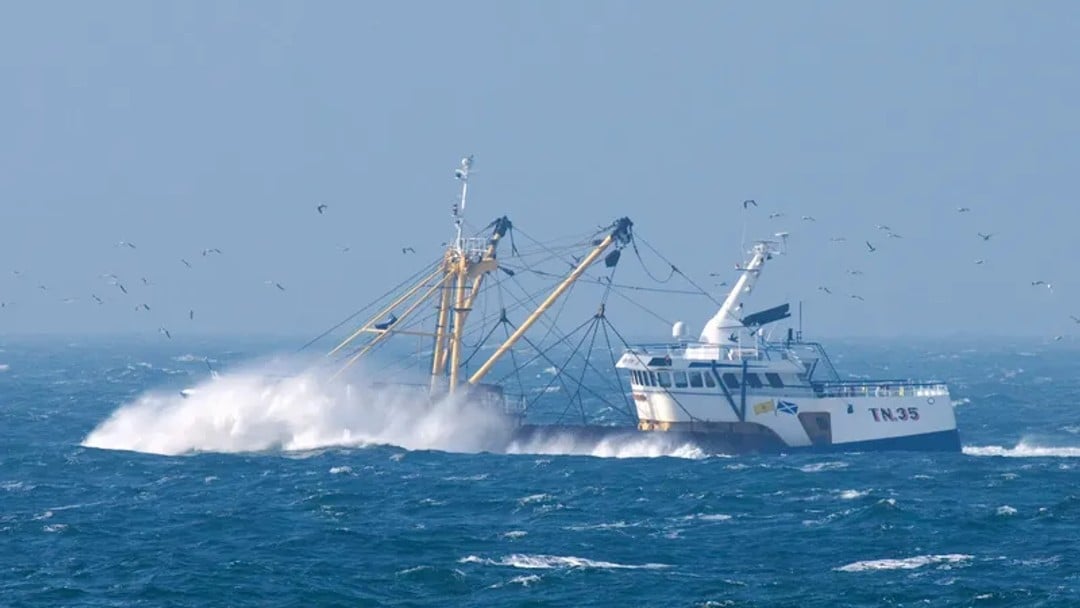Migrant fishermen’s fight leads to uk government settlement

By Law News
Exploited Ghanaian fishermen win compensation after UK government admits failure to prevent forced labour
A significant legal victory has been secured by a group of Ghanaian fishermen recognised as victims of modern slavery on a UK-based fishing vessel. The migrant fishermen, now based in West Yorkshire, have reached a settlement with the UK government over severe breaches of human rights, with each receiving over £20,000 in compensation. The claim against the Home Office highlights the UK government’s failure to uphold protections for migrant workers, a case that exposes systemic exploitation in the UK’s fishing industry.
The fishermen were employed on the Olivia Jean, a vessel operated by TN Trawlers, a fleet owned by Thomas Iain Nicholson, with financial interests further linked to his sons through TN Enterprises Ltd. Rescued in 2020 by the international seafarers’ charity Stella Maris, the men reported conditions likened to forced labor and servitude, including excessive working hours, minimal rest, threats, intimidation, and physical confinement.
Details of Exploitation on Olivia Jean
According to testimonies, the fishermen were denied basic human necessities and were subjected to grueling working conditions. They were held on the vessel without legal leave to enter or remain on UK shores, which effectively barred them from escaping the inhumane conditions. They worked extended shifts without breaks and endured racist and derogatory verbal abuse from supervisors, often threatened with retaliation if they spoke out. Many were forced to operate faulty and unsafe equipment, significantly increasing the risk of injury. Food and medical provisions were scarce, while living quarters were overcrowded and unsanitary, lacking safe drinking water and sufficient space to rest.
In addition to working conditions, the men’s restricted immigration status rendered them even more vulnerable. Issued transit visas as contract seamen, they were ineligible for employment rights within the UK. The fishermen argued that the Home Office’s failure to implement protections for contract seamen and its oversight of worker rights within UK waters amounted to a violation of Article 4 of the European Convention on Human Rights, which guarantees freedom from slavery and forced labor.
Legal Representation and Settlement
The fishermen’s case was brought to court by Stephanie Hill, a partner at human rights law firm Leigh Day, who represented the group alongside Shu Shin Luh and Agata Patyna of Doughty Street Chambers. Through rigorous legal action, the team argued that the Home Office had not only failed to protect the claimants from trafficking and exploitation but also neglected to establish effective mechanisms to identify and assist at-risk migrant workers in the fishing industry.
“This claim highlights a serious lapse in government protection for foreign workers, particularly migrant fishermen who are frequently placed in untenable positions due to restrictive immigration policies and the lack of statutory employment rights,” Hill said. “Our clients showed incredible courage in coming forward, and this settlement marks an important acknowledgment of the grave harm they endured. Stronger safeguards are urgently needed to prevent similar cases in the future.”
The settlement provides a level of justice for the men, who hope their case will inspire reforms within both government policy and industry standards to better protect vulnerable migrant workers in the future. Each fisherman was awarded more than £20,000 in compensation, an amount that, while significant, does not erase the suffering they endured.
Voices of the Victims
Speaking on behalf of the group, one of the rescued fishermen shared: “Being trapped on that boat felt like a nightmare. We worked day and night. The conditions were unbearable – there was no dignity, no respect for us as human beings. I’m grateful that we were finally rescued, but the scars of that time are still with me. This settlement is a step towards justice, but no amount of money can erase the suffering we went through. I hope that by speaking out, we can help stop this from happening to others.”
The Call for Government Reform
The case has reignited discussions about the urgent need for comprehensive reform in the UK’s approach to migrant workers. The fishing industry has been criticised repeatedly in reports from seafarer charities and human rights organisations, and this case further emphasises that without lawful immigration status or employment rights, migrant seamen are exposed to abuse. This legal case, along with a recent BBC documentary detailing similar abuses, reveals how some vessel owners exploit migrant workers, relying on restrictive visas and the fear of deportation to keep workers compliant.
Hill emphasised the importance of increased oversight: “The conditions these men faced were horrendous. They were forced to work relentlessly without adequate breaks, faced continuous threats, and were deprived of basic essentials like food and water. This case should prompt government agencies to reevaluate their oversight of migrant labor conditions, especially in industries where exploitation is known to occur.”
Next Steps for Advocacy and Reform
This settlement has marked a pivotal moment for migrant workers’ rights, bringing to light the severe gaps in protections for foreign contract workers in the UK. With advocacy groups like Stella Maris and Leigh Day leading efforts for reform, there is a growing demand for the UK government to implement effective oversight and better regulatory standards to prevent migrant worker exploitation in the future.

